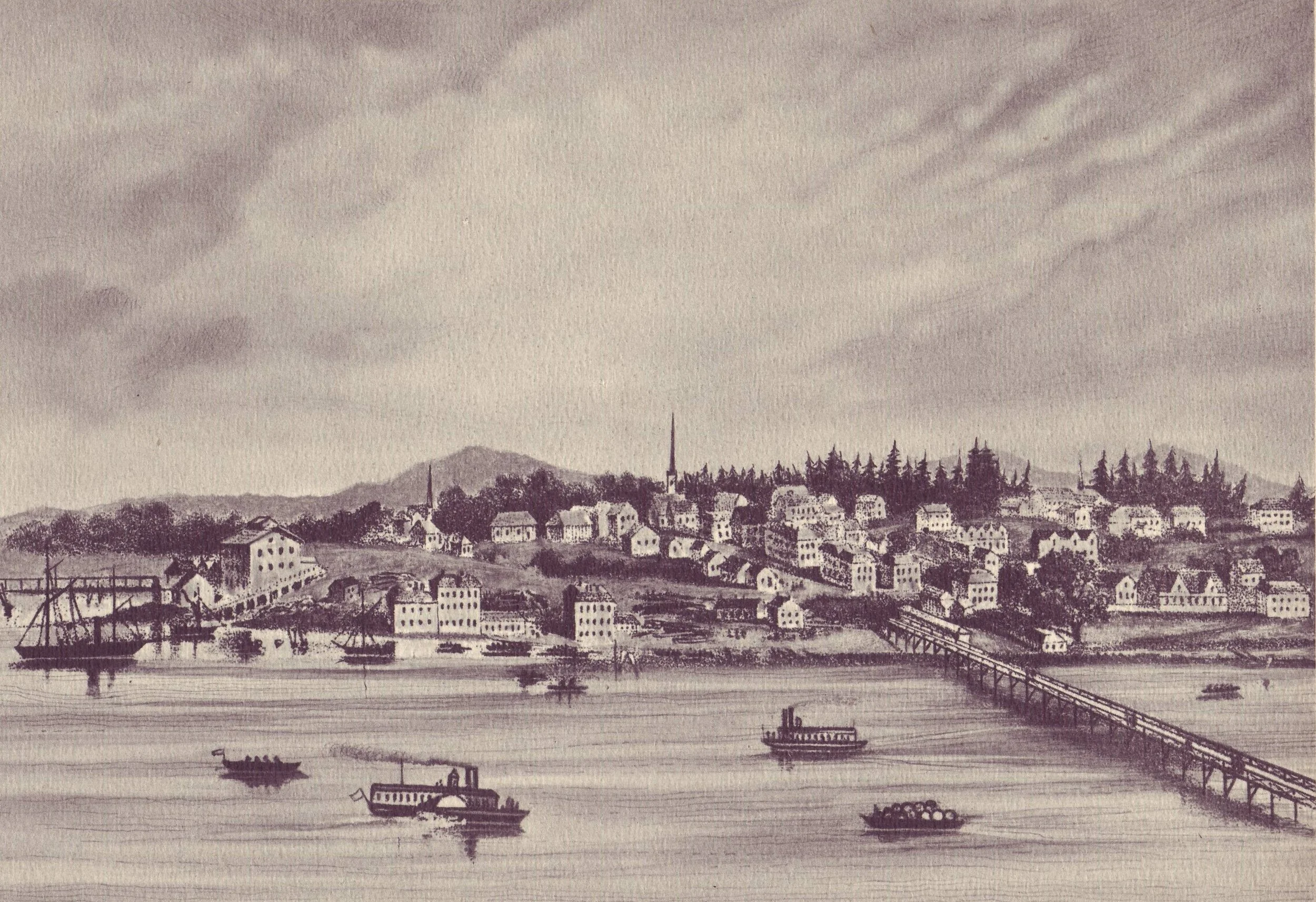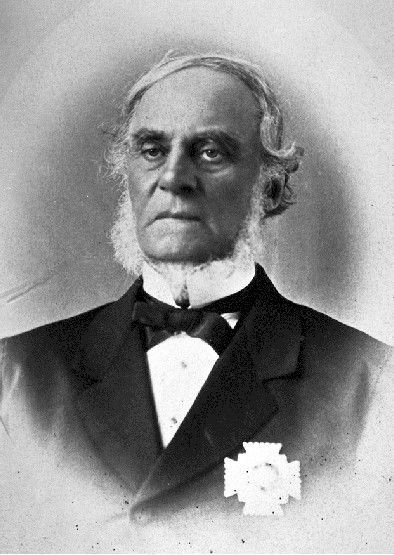The Acid Pen of Rev. Matthew MacFie
Pioneer British Columbians could be a weird and wonderful lot, as the Chronicles have often illustrated in the past.
Perhaps it isn’t surprising then that some of the earlier chroniclers who recorded for posterity the exploits of our more colourful pioneers were every bit as intriguing—sometimes even more so—than many of their subjects.
Rev. MacFie of the Congregational Church looks true to character in this family portrait—a grumpy old man. —www.pinterest.com
Certainly the good Rev. Matthew MacFie, FRGS qualifies in this category.
He was smart, learned and travelled. He wrote a massive book on Vancouver Island and British Columbia and has left historians a fascinating insight into gold rush Victoria. With eagle eye MacFie observed, analyzed and criticized all those with whom he came in contact during his five-year-long residency, from the highest office in the land to the lowest of 1860s frontier Vancouver Island society.
Friends, acquaintances, strangers and enemies were captured on MacFie’s canvas, the artist painting colourful, often less than flattering portraits of the high and humble. Few measured up to his exacting standards—indeed, few mortals could. Certainly not those who weren’t upper-class British, harrumph!
A ‘gentleman’ to the core, MacFie chose to view the world through a very small glass. Despite this failing, his writings aren’t without value. Prejudiced MacFie may have been, but he was intelligent, observant and curious.
As a result, he has left us with an intriguing canvas of Fort Victoria and many of its leading citizens.
* * * * *
As proof that MacFie didn’t turn a blind eye to the painfully obvious, it must be noted that he’s the historian who recorded for posterity that the future capital city’s richest members of the fair sex were its prostitutes.
Victoria as it appeared at the time of MacFie’s residency. —Sun Life Insurance
The city's male population didn't escape his notice—or condemnation—either. As most of the white population consistent of single young men of almost every nationality and from all walks of life, it’s only natural that he should have devoted almost an entire chapter of his classic work, Vancouver Island British Columbia, to their errors and omissions.
This chapter, he tantalizingly entitled, "Young Colonists: Their Temptations and Dangers."
Indeed, temptations and dangers there were, lurking around every street corner! Most young men were transients and had feet of clay despite the fact that many were well-connected in the Old Country and possessed of a good education. But, half a world from home on the British Columbia frontier, their habits (according to MacFie) revealed them to have been “black sheep in the domestic fold at home”.
Although he reluctantly conceded that some of the newcomers were fine, upstanding members of the community who’d brave every obstacle and peril in their pursuit of honest endeavour, he made a point of illustrating the dangerous that faced them in outpost Victoria.
“If... there be any vulnerable point in the character of the young and inexperienced colonists,” he wrote, “it is certain to be hit by the arrow of temptation.
“It is impossible for the imaginative youth, surrounded with the blandishments of fashionable English life, the associations of the Church, the proprieties of the debating club, or the restraints of fond relationship, to over-estimate the fiery trial that awaits him when thrown like a fledged bird from the maternal nest into the society of strangers, for the most part selfish, and interested in the ‘greenhorn’ only as far as they can profit by the attention they pay him.
“Should his concern for speedily entering on a money-making career outweigh that better judgment which compasses its end by cautious measures and slow degrees, and looks out first for a right start, nothing is more probable than that he will be pounced upon by those disguised falcons that are ever on the watch for such a quarry.”
Time and again, he’d witnessed these vultures at their evil work, resulting in "young man beguiled and stripped of wealth, possessions and self-respect”.
"Over the mortal remains of how many promising characters, wrecked on the shoals and reefs against which friendly warning has been given above, have I been called to perform..."
Drunkenness and debauchery, he wrote, were the major crimes committed by young men alone in the New World without family, friends and, perhaps most important of all, worldly experience. This wholesale tragedy could be laid to a single cause in MacFie's opinion: the want of eligible and respectable young ladies. “It is only to be regretted that the paucity of respectable females in Vancouver Island and British Columbia limit so much the opportunities of single men who desire to cultivate domestic virtues, and lead sober lives."
If, on the one hand, MacFie decried the idleness and weakness of the young and underemployed, he had even less use for one truly self-made man, former colonial governor Sir James Douglas.
For all of his achievements, former colonial governor Sir James Douglas drew only scorn from Matthew MacFie. —www.pinterest.com
A snob to the core, MacFie despised Douglas, a man of mixed blood. The sarcasm is totally out of place in a book supposedly published as a guide for potential immigrants to the Island and B.C. He obviously couldn’t resist the opportunity to defame the one-time colonial leader in print.
Patronizing in his description of Douglas's appearance and deportment, MacFie attributed the pioneer leader’s stern bearing to his early association with the fur trade: “Deprived, during the greater part of his life, of the advantages of society, except that of Indians, half-breeds, and persons like himself occupying humble situations in the employ of the [Hudson's Bay] Company, every praise is due him for not being indifferent to mental culture in those mountain solitudes in which the flower of his manhood was passed.
“The stateliness of his person—of which he always seems proudly conscious—and his natural force of character suggests the reflection to an observer, how vastly more agreeable would have been his address and powerful the influence of his character and abilities had he enjoyed in early life a liberal education and intercourse with persons of refinement and culture...”
“His efforts to appear grand, and even august [MacFie’s italics], were ludicrously out of proportion to the insignificant population he governed—numbering less than the inhabitants of many a country town in England.
“When he spoke to anyone within the precincts of the Government House, his Quixotic notions of his office, which he evidently thought splendid, prompted him to make choice of the sesquipedalian diction he employed in his dispatches.
“The angle of his head, the official tone, the extension of his hand, the bland smile which never reached beyond the corners of his mouth—all these stiff and artificial arrangements were carefully got up and daily repeated by him under the delusion that the public imagined him to be a natural and a perfect Brummell in politeness.
“His manners always gave one of the impression that to make up for early disadvantages he had religiously adjusted his whole bearing to the standard of Lord Chesterfield, and it is needless to say how amusing was the combination of his lordship and this dignified old fur trapper.
“His attitude toward the officials serving under his government was a austere and distant. This he had acquired under the sort of military regime observed between the officers and Servants of the Hudson's Bay Company. I have heard magistrates addressed by him in a pompous manner that no English gentleman would assume toward his porter.
“But Sir James solemnly felt that ‘the machine of state’ could only be kept in motion by his delivering commands, with head erect, and with that rotund and peremptory utterance which at once betrayed and excused vulgarity...
MacFie wasn’t finished; even Douglas’s appearance drew his scorn.
“He was rarely visible at his desk or in the street without being arrayed in semi-military uniform; but the climax of his extravagance was probably capped by his being followed perpetually, whether taking an airing in the country or going to visit, by an imposing orderly, duly armed and in uniform.
“In so small and practical a town as Victoria, the temptation of the local wits to satirize so preposterous a spectacle was irresistible."
There’s no denying that Rev. Matthew MacFie, FRGS, left us an intriguing glimpse of Fort Victoria and Vancouver Island of the 1860s. In so doing, he also left us a revealing—unflattering—portrait of himself.
For all of MacFie’s rancour, to James Douglas goes the credit for British Columbia even existing today as a Canadian province; he is, in fact, an unsung Father of Confederation. As for Rev. Matthew MacFie, FRGS—Matthew who?




